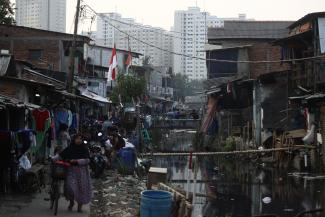Urbanisation
Jakarta’s lasting challenges

Indonesia’s capital, Jakarta, is a strange mix of high rises and slums. It is easy to walk through both types of neighbourhoods. They are not far apart, and in some places, crossing a single road is enough to move from where the upper middle classes reside to where the poor live. Many informal settlements, which are called kampungs, have existed for generations.
Surrounded by 13 rivers, Jakarta grew from a port settlement in the 4th century. About 11 million people live within the city limits today, and the agglomeration is home to 28 million. Fast population growth has generally exceeded the construction of good new housing. Several thousand new affordable formal homes are built every year, but more are needed. Infrastructure provision has not kept up either. Waste management, water supply, electric-power provision et cetera are difficult.
The climate crisis is making the problems worse. About 40 % of the city sits below sea level and is prone to flooding. Some waterfront areas are continuously inundated.
Of 20 major cities in Southeast Asia, Jakarta ranks 11th in regard to the cost of living, according to Numbeo, the collaborative online database. However, in terms of average purchasing power, it ranks 15th. Singapore tops both lists, and its purchasing power per capita is five times higher than Jakarta’s.
Jakarta’s lower-income people live in the kampungs. Many of them work as household helpers, drivers, small businesses and shop workers. The employment situation tends to be as informal as their housing. To a large extent, the more prosperous people depend on their services.
Not only Jakarta’s population is growing, its economy – including the formal sector – is expanding too. Land prices, already exorbitant, keep increasing. Ever more commercial high-rises are being built to provide both offices and new apartments. There is ever less land available for kampungs, and people are increasingly forced to move to the urban fringes. One consequence is worse traffic congestion, making commuting more stressful for everyone. In spite of new highways and light-rail lines, transport and air pollution remain nightmares.
Singapore, which is an hour away by plane, is often considered an example of what a capital city should be like. Indonesia’s government does so too. The plain truth, however, is that Singapore does not face the same problems. The city is younger, its development was better guided by urban planning and, in past decades, this tiny nation state had more control of inward migration. The authorities in Jakarta, by contrast, could not keep Indonesians from moving to Jakarta, where opportunities to earn a living were always better than in disadvantaged rural areas.
Starting from scratch thus seems attractive, and the government has indeed decided to move the capital to the border between Kutai Kartanegara Regency and Penajam North Paser Regency on Kalimantan, the Indonesian part of the island of Borneo. Kalimantan has an area the size of France and Germany combined, but a population of only 20 million. The target is to complete government buildings in the new capital by 2024. While Jakarta is on the western end of Java, Indonesia’s most populous island, Kalimantan has a more central location in the vast archipelago.
Relocating to a new capital in an uncontested setting may provide some comfort to the government and its bureaucracy. The examples of Islamabad in Pakistan, Abuja in Nigeria or Brazilian Brasília show that this is feasible. The bigger challenge, of course, is to invest in making Jakarta more liveable and sustainable. Relocating the government may reduce the pressure to some extent, but it is not a simple solution. As Karachi, Lagos and Rio de Janeiro prove, megacities require attention even after a national government has moved away.
Edith Koesoemawiria is a freelance journalist.
hidayati@gmx.de







